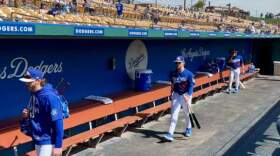The Golden State Warriors formally announced the signing of former Oklahoma City Thunder star forward Kevin Durant on Thursday. Durant publicized his decision Monday, but Thursday marked the first day free agents could sign their deals. He agreed to a two-year contract worth more than $54 million.
During a news conference at the team's practice facility in downtown Oakland, Durant said the relationships he built in Oklahoma City made the decision to leave difficult.
"I went back and forth for two or three days,” Durant said. “Those nine years you can't erase. That love doesn't fade. Those memories don't erase. It's always going to be part of who I am."
Oklahoma City’s identity has been tied to Durant ever since he emerged as one of the game’s elite players. State Sen. David Holt, R-Oklahoma City, served as Mayor Mick Cornett’s chief of staff during negotiations to bring the Thunder to Oklahoma. He’s also the author of Big League City: Oklahoma City’s Rise to the NBA.

Interview Highlights
On How Oklahoma City’s Identity Changed Over The Past Three Decades
The city's image became a chief concern of city fathers 25 years ago. I think they finally realized what really mattered was quality of life and that the new paradigm was that the jobs went where the people wanted to live. And the people didn't want to live in Oklahoma City, and that they had to address quality-of-life issues. Kind of hand-in-hand with that is you're tie to American pop culture, and whether you're a place that young people associate as a city where things happen. We weren't a city where anything happened. While at the same time, we were working on certain quality of life initiatives through the MAPS programs, and that meant building the canal and the Bricktown ballpark, and putting the dam on the river which ultimately became this rowing community, all of those things were going hand-in-hand with the initiative of trying to get a major league sports team, which we felt would be our golden ticket into American pop culture. And we got it, and it was. Even though the news this week was very saddening to Oklahoma City about KD leaving, it was international news. Nothing that happened in Oklahoma City prior to the Thunder's arrival in 2008 was international news other than the Oklahoma City bombing.
On What Made Kevin Durant Such A Good Face For Oklahoma City
We've had people that have been wildly successful in things in the past, but they may not have been something with the notoriety of the NBA. First of all, we had someone who was participating in something that was known around the world. And then secondarily, he was excellent at it. He was an MVP, so we had one of the best players of all time. And then finally, of course, he was a great ambassador. He was a good person. He did all the right things. He said all the right things. He seemed to love our community as much as we loved him. And I think he did up until obviously this time that he decided to go a different direction. But I think while it lasted, it was wonderful.
On Lessons Oklahoma City Can Learn About Managing Its Identity And Image
If this were 10 years ago, the opening of the whitewater rapids in Oklahoma City this past six months would've been one of the biggest things that ever happened. But you have to say it was probably overshadowed by our playoff run that was happening at the same time. So I think with KD's departure, and the fact that he had become so tied to our image, obviously we're going to have to redouble our efforts to create a positive image internationally and across the country that is not so tied to one man. And I think that's a lesson to be learned - one that we've never had to deal with before. These are all new phenomena for us in Oklahoma City. But I kind of call it the taxi cab driver test. What does the taxi cab driver in Istanbul, Turkey ask people who he meets who come from Oklahoma City? And right now, for the last five years, it's been KD, absolutely. And now it's not. He's no longer a part of Oklahoma City. And that's kind of the danger of putting so much stock in one man who has free will to leave.
KGOU relies on voluntary contributions from readers and listeners to further its mission of public service with arts and culture reporting for Oklahoma and beyond. To contribute to our efforts, make your donation online, or contact our Membership department.







